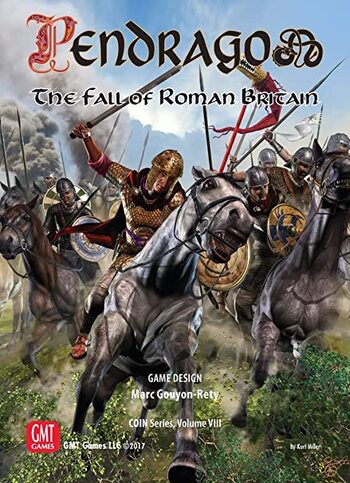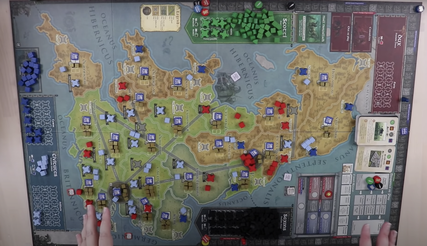 What is this game about? Pendragon: The Fall of Roman Britain is a COIN game set during the 4th and 5th centuries A.D., when the Romans still occupied Britain, but their power there was starting to wane. In the game, four factions each pursue different goals—the Dux, or Roman military, wants to maintain control over Britain, as well as increase Roman prestige in the area. The Civitates are their frenemies—Roman-British civilians who are also interested in stability and control, but who want to wrest power from the grabby Dux faction. Early in the game, the Dux can spend the Civitates' money, while the Civitates benefit from the support of Dux military forces. But both factions are careening towards fragmentation, when they split from each other and change the face of the game. Their common enemies are two factions of barbarian raiders—the Scotti from the west, who are looking for a tidy profit, and the Saxons from the east, who are initially only in it for the money but who develop an interest in a more permanent settlement post-fragmentation. Because Pendragon is a COIN game, the action always starts with an event card—one event card is active per round, and each faction in the game has a chance to act in the order printed on the card. But there's a catch: Only two factions get to take a turn per event card. Factions also cannot act two rounds in a row, which means that players will need to make important decisions about tempo. Everyone is able to see both the current event card and the upcoming one, and sometimes it is in a player's best interests to pass during one round, giving up a chance to take a turn because they want a crack at the event card that's currently on deck. Once a player decides to take a turn, there are even more interesting choices involved. If you choose to take the event printed on the card, then the second player for the round gets to take a full action. If you take a full action, the second player for the round might get to play the event card themselves. But if you take a limited action, you also limit what the second player for the round can do—by hobbling yourself, you also put a damper on your opponent. Your faction also has its own set of actions to take. You might want to move units, build, or fight, and all of these will cost you precious resources. The result of all this is a big, messy conflict that mirrors all the interesting parts of the decline of Rome's power in Britain. Every so often, an Epoch card will emerge from the event deck, which triggers a special round during which players check for victory conditions. If any faction is meeting its victory conditions during an Epoch round, then the player of that faction wins. Otherwise, play continues. If no clear winner emerges by the final Epoch round, then players tally points based on their individual faction goals to determine the winner. How does it play solo? Pendragon comes with a bot for each faction, so you can play one faction yourself and use bots for the other three. These bots are flowcharts that ask you to check the board state and then make the most logical choice for the faction that is taking a turn. In Pendragon, I think it's best to start by controlling both the Dux and Civitates factions before fragmentation, then take over whichever faction is weakest after fragmentation (this encourages you to give equal love and attention to each faction during the early part of the game). The Scotti and Saxons have simpler bots to run, which will make your first solo games go more smoothly.  The board is so big I usually leave it sideways. The board is so big I usually leave it sideways. Overall Thoughts As a simulation of Roman history, Pendragon is fantastic. From the fascinating designer notes and bibliography to the actual gameplay, where tensions between factions play out in ways that mirror historical events, this game is steeped in its setting. It's obvious that Morgane Gouyon-Rety knows her stuff. And when you play her game, you'll come out knowing a bit more, too. As a game, Pendragon is full of delightful choices. How closely should the Dux and Civitates work together, knowing full well that a split is on the horizon? When is the right moment for invading barbarians to try to settle down in the land they've pillaged? When is the event on a card really worth taking, as opposed to taking a normal action? And is it safe to go for it and take a big turn, knowing full well that another faction might take advantage and do something irritating to hurt you? Resources are precious, which means that every decision, from splurging to pay for road maintenance to engaging in battle, can have serious consequences. This game does not reward careless decision making, and even the best laid plans can be torn apart by some bad die rolls during conflict. Pendragon also represents an interesting development of the COIN system. COIN (COunterINsurgency) games typically focus on specific conflicts between powerful governments and insurgents within a limited period of time. Pendragon covers centuries, and to fit its theme, it dispenses with common elements in other COIN games, such as guerilla fighters. I liked most of the tweaks made to the system, and I think the design decisions were well made for Pendragon's setting. That said, Pendragon is a heavy game within an already-heavy system. It is the most complex COIN game I have played, and while every aspect of the game makes sense and is explained in the rulebook, there is a lot going on, especially when moving through all the stages of a battle. It is not a casual game for a lazy afternoon--Pendragon is a rewarding but very consuming experience, even if you choose to play only a short game. (There are several scenarios of varying lengths.) I adore playing this game, but I also know that it won't make it to my table as often as I would like. I also think that it is easier to play some factions than others. When soloing as the Scotti, it seems easier to roll over the Dux and Civitates than it does to play as the Romans who are trying to squash those pesky barbarians. I intend to keep testing this theory over time. Do I recommend it? If you want a deep game that is both excellent to play and excellent as a historical simulation, then Pendragon is a great choice. But be ready to invest a lot of time and effort into learning it, particularly if you do not have experience with COIN games. (I personally would recommend starting with a different game in the series, but perhaps you wish to live dangerously.) Overall Rating: 4 stars Rating Scale: 5 stars - I love it! 4 stars - I really like it. 3 stars - I like it. 2 stars - It's okay. 1 star - Meh.
2 Comments
Sam Gilson
9/15/2020 03:25:54 pm
What would you recommend as a first COIN game?
Reply
Your comment will be posted after it is approved.
Leave a Reply. |
AuthorMy name is Liz Davidson, and I play solo board games. A lot of solo board games... Archives
August 2021
Categories
All
|
 RSS Feed
RSS Feed